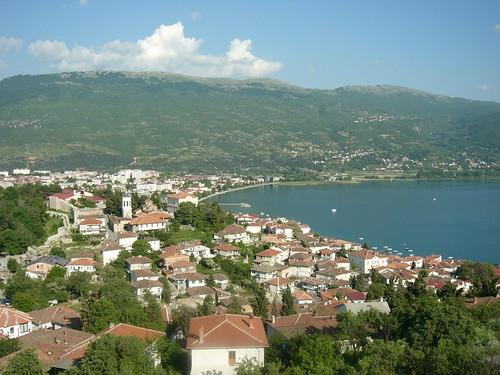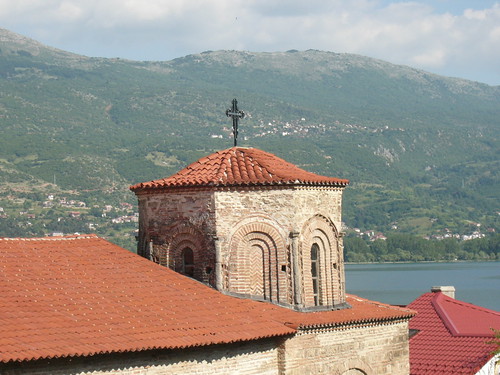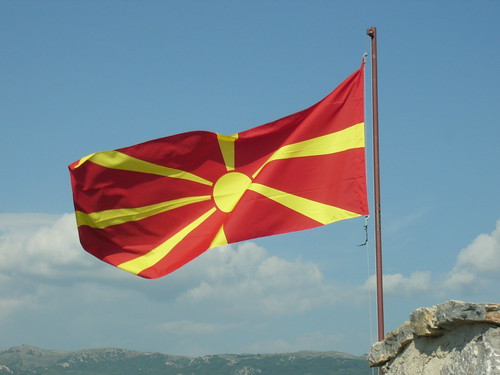This is driving me nuts. I have just spent the last hour or two going through my e-mail, and my Internet-cafe neighbour is having cybersex with some Arab. Actually, I think he is in Turkey, but she has been showcasing some Arabic words. She started with teaching him Macedonian – yelling “da! da! da! (yes! yes yes!) – and now she has mellowed, calling him her ‘lotus’ and asking “why has this happened to us, I want to be near you. Honey” whilst smoking a cigarette. Think of a phone-sex line, where there is a fat woman on the other end moaning and groaning. Except this girl isn’t fat – just ugly. And really loud. Really fucking loud. Damn it, I did it. I tried to not swear in case any kiddies are reading this, but I feel some much better now. FUCKING SHUT UP.
Okay, much better.

Macedonia has been quite delightful (Greece get over it – I am not calling them Skopje, or the (Former Yugoslav Republic of Macedonia). I got in Friday night, and tomorrow morning (Wednesday) I will be leaving my temporary home for the last few days, in Ohrid. Ohrid is described as the tourist Mecca of Macedonia. Lots of Churches here as well, which goes back to Ohrid’s historical importance. It is right beside Lake Ohrid, which is approximately 2-3 million years old, and is one of the world’s oldest lakes and the Balkans biggest. Given its age, there are a lot of unique biological aspects, like that freakin’ animal that sounds like a baby laughing. It took me half an hour to work out it came from the lake.
“I love you honey. I. Love. You” Can someone please get this girl a vibrator?
Ohrid is a great tourist destination. The Old Town looks like any modern cosmopolitan city’s shopping arcade, with the latest fashion, jewellery stores, and cafes and restaurants abound (although funnily, about 90 per cent of these restaurants either have ‘Pizza’ in their name or make it a focal point of their menu). It is very scenic with the surrounding hills, and the lake. But the best thing is the cost of living: my first two nights were in a fully equipped private apartment, which cost the equivalent of 10 Euros a night. My remaining three nights were in a private room in the Old Town, for about six Euros.
And then there was the food. You could eat yourself silly and not want to think about food and drink for another 24 hours, with just 10 Euros. A main meal, like lets say – Pizza – costs about 100 Denars. My Hungarian Goulash tonight cost 150 Denars (60 Denars to the Euro). Add a few drinks, and a salad, and you could pay 300 Denars (five Euros) and be very satisfied. There are high-speed internet cafes all over the place, asking for one Euro an hour. Why I am so surprised, is that although the cost of living is comparable to Albania, the place looks every part like a modern European city (unlike Albania, which is a permanent pile of rubble and construction). And minus the foreign tourists; whilst plenty of Australians come, they are all ethnic Macedonians. I stood out like a sore thumb with the locals. I would like to think it’s because I am a good looking guy, but I think it’s just because I looked so different to everyone. Although I must admit, the women did tease a lot…
Yes, it is true. The women here are beautiful. And they definitely know how to shake that arse. Apologies to all you feminists out there, but if you are wondering why you are 35 and still can’t find a husband, maybe you should learn from your Slavic sisters when it comes to style. Unfortunately I have been told that I missed out this year – the fashion this year is tight jeans with stomach showing. Last year it was mini-skirts with g-strings showing. Just as well I came this year – I had enough trouble trying to conceal my grunting at the glamour?¢‚Ǩ‚Ñ¢s walking past me.

However for every positive, there is a downside: the men. Absolute scum bags. Not all, but a lot of con artists. I was seen as a walking money bag. You would as well, if you worked a minimum wage job in any developed country! The problem, as everyone would complain to me, was the economy – which I suppose is why Eastern European countries and the Balkans are famous for these con-artists, as their economies are still a mess. Half the people I spoke too dreamt of one day leaving – however the other half were very proud of the country. I think my second landlord, was the most eloquent in explaining this to me.
Nikola is a 38-year old university graduate (in economics), working for the police as an investigator. Actually, he was in a team of six that was selected by the US state Department for anti-terrorism training, so this guy is no monkey. He has three kids, and a modest house in the Old Town, where he rents the top rooms for some extra cash. He, like everyone else, said the economy was very weak, with no developed export markets and no opportunities for work. The wages are super low – Natasha, a girl from a tourist office, was telling me she gets paid 200 Euros a month. Eljah, a pimple-faced 18-year-old tax driver whom I used several times as my personal chauffeur, says 200 Euros is a lot – he said he averages about five Euros a day.
However unlike Natasha and Eljah, Nikola realises this is just temporary and is willing to sit it out. “Every country has problems at different stages. In this age for Macedonia, it is the economy”. He sees it as a temporary phase as the country develops itself. However what we both agreed on was that Macedonia desperately needed to be part of the European Union (EU) for that ‘phase’ to ever pass. However with the French and Dutch rejecting the new EU constitution these last few weeks, it might mean it will take longer than hoped. (It will happen – as Nikola said, the EU has become too strong to just disappear now.)
I become very fond of my afternoon chats with Nikola. Despite the fact he hasn’t used English since primary school, I could feel his English improving by the minute, as we used sign language to have conversations about global imperialism and the rise of India and China (and America?¢‚Ǩ‚Ñ¢s future), as well as what Macedonia needed to do to get ahead. If anyone was watching the time when I was saying Macedonia needed to look at emerging industries, not old economy industries such as biotechnology against agriculture – I think they would have died laughing. How do you explain biotechnology to someone who doesn’t speak English?
Macedonia is a fairly small country, with about two million inhabitants. The country gets bullied around by its neighbours because of its size, and its economic dependence on countries like Greece. However the economy is the only bad thing about this place, and it is only bad if you want to live here. If you want a holiday, I highly recommend Ohrid. It is four hours from Thessalonica in Greece.
As for my experience in the country, it has been okay. I went to a nightclub on Saturday on my own, which was a little weird, because I have never been to a nightclub on my own. I had to pay five times the normal cover charge (like I cared, it was only five euros). I met some girls there who were very playful until the drunk mafia guy came. He was a Melbourne-based Macedonian, and he had a gun on him. He got me free drinks, so I wasn’t complaining. However, I wasn’t arguing with him either.

But I have had enough being the rich tourist amongst all the other tourists, I have to get out of here. I better go and pack my bags – my bus to Nish in Serbia leaves in just over three hours!
Update:Who would have thought, that a 5am bus trip to Skopje (transit point for Nish), would have me sitting next to a tall, blue-eyed, blonde-haired, beautiful woman who was super intelligent and from a wealthy family (a rare thing in itself in Macedonia)? We got cosy on the bus and spent three hours talking non-stop! But the reason I am including this update is because she was able to explain something to me which finally helped me understand a major issue, and which I think deserves to be included on my posting about the country.
Macedonia is now being divided into two versions – traditional Macedonia, and the Albanian Macedonia, whom refuse to integrate into the local population, and adopt the country’s traditions and culture. There was a big war in North Macedonia in 2001, and a treaty was signed. We are not talking about some petty differences here. There are some huge tensions, which I sensed, but didn’t understand. The war is still recent memory, and it doesn’t seem like the issue is resolved. Something bad is brewing.
There is a a lot of racism in the country over Albanians. Why you may ask? Well it is not the Albanians that have settled and adopted Macedonian life, but the refugees and illegal immigrants that flooded the country during the Kosovo war. Ethnic Albanians now constitute about 20 per cent of the population, and have become such an influential group, that the country has to accommodate for them. The Albanian language just recently became an official language of the country, and various other measures have been put in place, which quite rightly, are making the population quite angry. As Karolina lamented, she feels like she doesn?¢‚Ǩ‚Ñ¢t know what her identity is. To get a pubic sector job, she is required to learn an entirely new language! It is a bit like the Hispanic situation in America, where all these illegal immigrants that crossed the border from Mexico, have become such a powerful minority, that the politicians are scared of them. And like the Spanish kids, they refuse to speak Macedonian and speak only Albanian.
To cut a long story short: we haven’t seen the last of the Balkan wars. The South of Serbia, and the North of Macedonia will be on our television screens in the near future.
As for Macedonia’s economy, she was also able to explain a few things to me as she is an economics student. It appears the country is trying too hard to satisfy EU requirements to become a European Union member – rather than actually make any efforts to develop the country itself. It seems like pretty much all of Macedonia’s problems, stem from the former Yugoslavia. With respects to the economy, what she meant was that all the industries and factories were in other parts of Yugoslavia – not present-day Macedonia. The result was that the disunion left the country with an inheritance of nothing.
